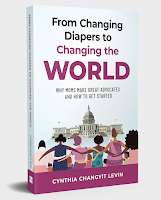 |
| Image: MLK Jr. memorial in Washington D.C. Photo credit: Cynthia Levin |
Have you ever been to the Martin Luther King Jr. memorial in Washington D.C.? It's one of the most moving memorials in a city so full of monuments and memorials that you can hardly remember all the people you’re supposed to be remembering. Rather than having some anonymous obelisk or rotunda, MLK Jr.’s figure looms larger than life as he emerges from an imposing block of stone. Surrounded by his own quotes, there is no doubt whose statue you gaze upon. When I look at the face the sculptor gave him, I see determination of a strong organizer and I see a challenge to authority. And maybe, I see a challenge for me to BE a strong organizer who can BE a challenge to authority.
 |
| Image: Tying fringe on fleece blankets is an activity even kids can do! |
And yet, the reason we celebrate his life wasn’t because of his charity, was it? Like any pastor, he probably looked favorably upon any activities helping people in poverty. But the reason we know who he was at all is his dedication to advocacy and non-violent protest.
Martin Luther King Jr. was not an advocate who played it safe. He knew when he went to Birmingham that his actions might land him in jail. That's exactly what happened. He took that imposed time of reflection and cranked out his legendary “Letter from a Birmingham Jail.” If you haven’t read it, it’s a letter written to leaders who criticized his methods as an agitator and his urgency to take disruptive action.
There are so many gems in this letter that I won’t list them all here. But I'll point out that he directed his letter at moderates who were supposed to be on his side, but were so inactive that they played into the system of oppression. If you are ever showed discomfort with Black Lives Matter by not showing up for a protest (that would be me) or insisting that “All Lives Matter,” he was writing to you, too. Read the full letter at this link or even just the passages below and allow yourself to be a bit more disrupted:
“You deplore the demonstrations taking place in Birmingham. But your statement, I am sorry to say, fails to express a similar concern for the conditions that brought about the demonstrations.”
“I must make two honest confessions to you, my Christian and Jewish brothers. First, I must confess that over the past few years I have been gravely disappointed with the white moderate. I have almost reached the regrettable conclusion that the Negro’s great stumbling block in his stride toward freedom is not the White Citizen’s Counciler or the Ku Klux Klanner, but the white moderate, who is more devoted to “order” than to justice; who prefers a negative peace which is the absence of tension to a positive peace which is the presence of justice; who constantly says: “I agree with you in the goal you seek, but I cannot agree with your methods of direct action”
When I read his words and think about the conditions he was writing from (“what else can one do when he is alone in a narrow jail cell, other than write long letters, think long thoughts and pray long prayers?”), I think we can all borrow a little inspiration and courage from him to be a bit more disruptive in our country and our communities.
We can’t all be Martin Luther King Jr, but we can strive to be like him and honor his legacy by opening our eyes to what’s around us and using our words to challenge oppression in its many forms. So after you see to your charitable action today, ask yourself, “How can I use my words in this time to fight poverty and oppression?”Will you take a stand against book banning? Will you oppose a state bill that bans the teaching of accurate Black history? Will you ask legislators for funding for maternal care for low-income mothers? There are so many ways to fight oppression and honor the legacy of Dr. King. Let’s all pick one and commit ourselves to actions, so next MLK Day, we can say that we answered his call.

Image: Book cover
Buy an autographed copy of "From Changing Diapers to Changing the World: Why Moms Make Great Advocates and How to Get Started" at my website www.changyit.com or order it from Amazon, Barnes and Noble, or any independent bookstore!



No comments:
Post a Comment